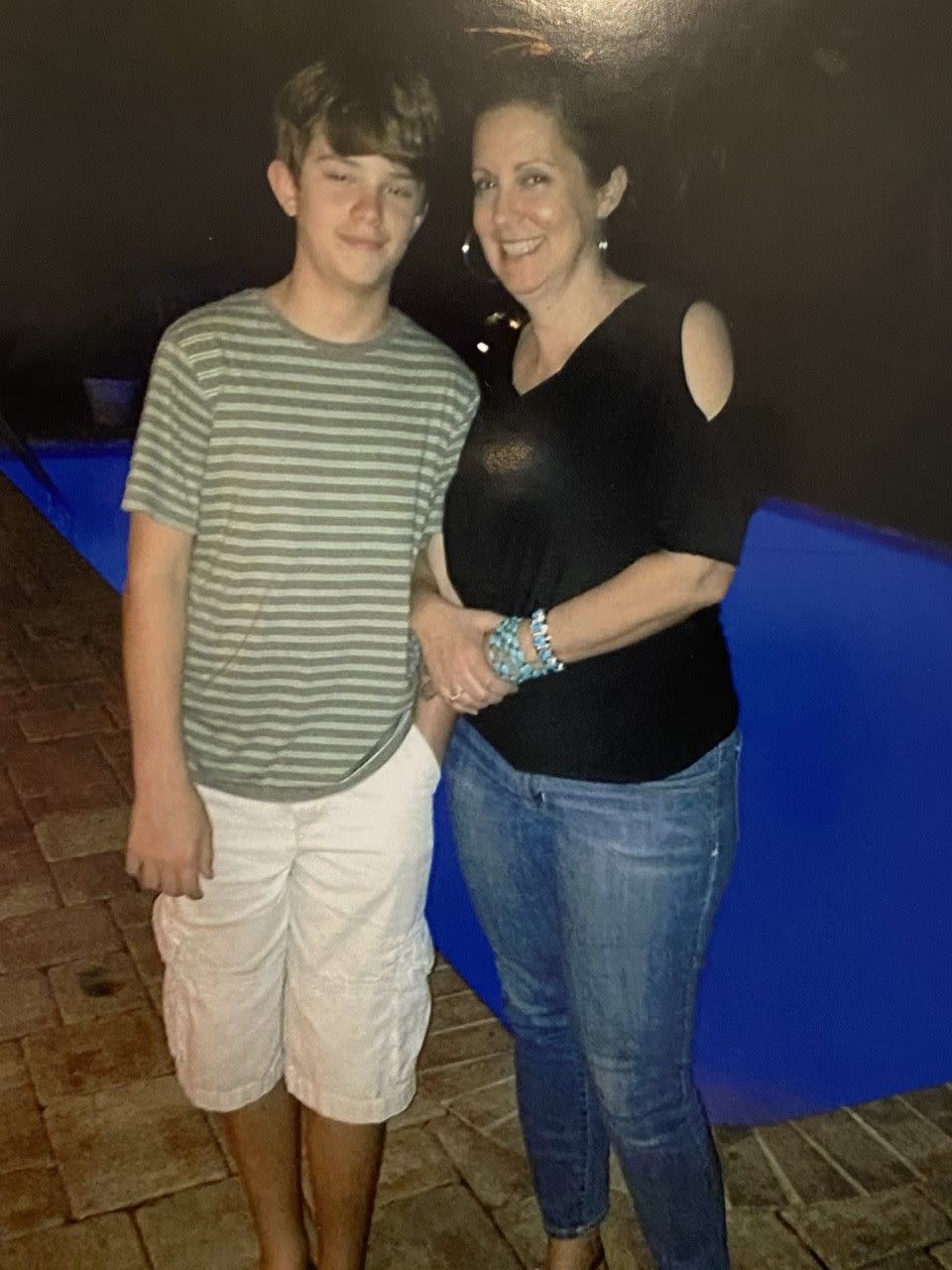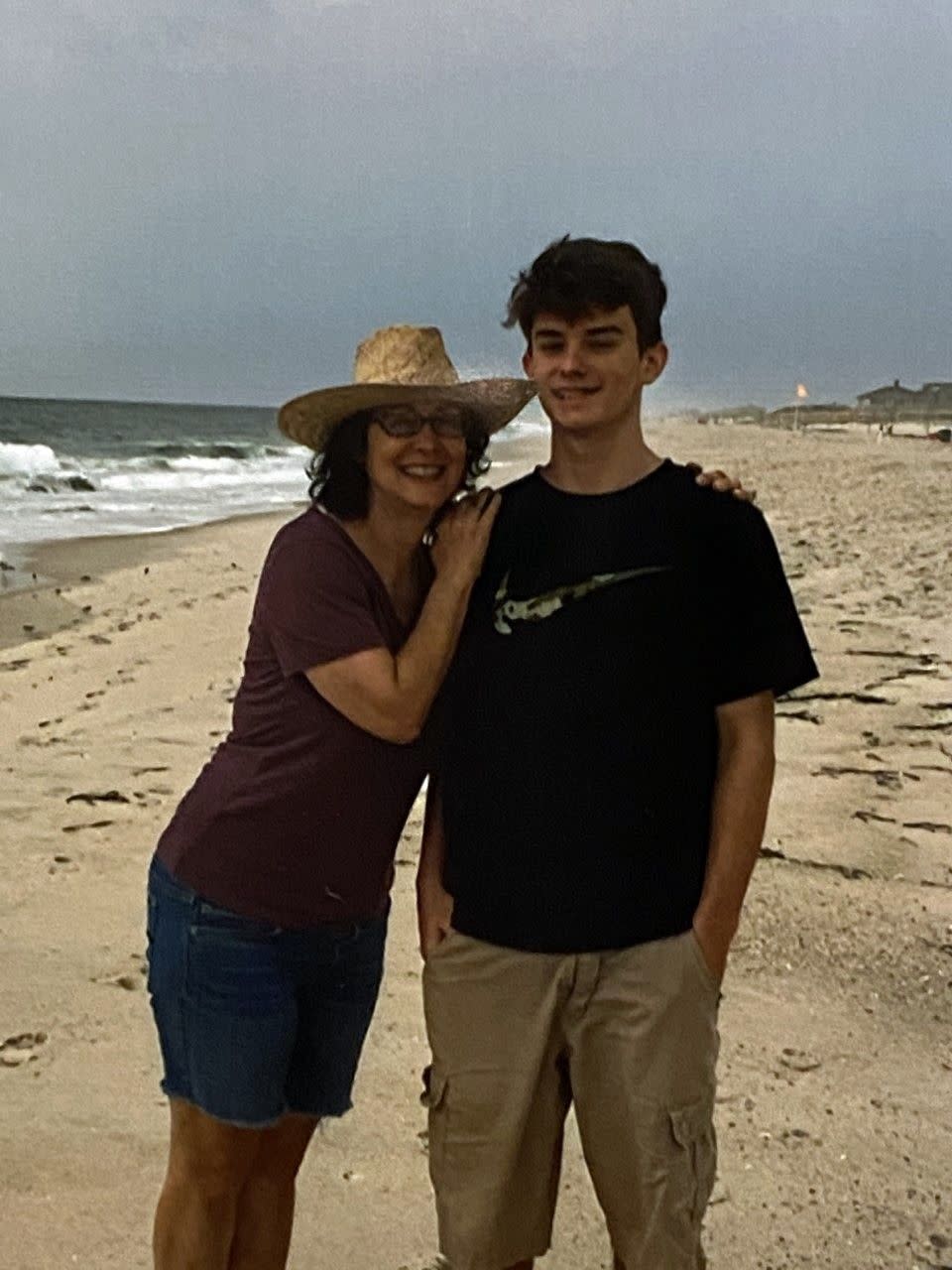‘I Thought I Just Had Bad Period Cramps. Then I Was Diagnosed With Ovarian Cancer.’

I first began experiencing strange symptoms at the end of summer in 2012. I remember it was Labor Day, and I had the day off from work. That morning around 10 a.m., I felt lightheaded and began to experience severe abdominal pains. I thought I was dealing with intense constipation and menstrual cramps.
I’d felt completely fine the day before. And while I’d noticed that my periods were a little heavier than usual lately, when you get into your mid-40s, they say sometimes your period is light and sometimes it’s heavy. So I didn’t think that was anything out of the ordinary.
As the day went on, though, my symptoms continued to worsen. I drank some coffee, thinking it would help with the constipation, but the pain wouldn’t go away—nothing worked. I started having more GI symptoms including a stomach ache and heartburn.
Around noon, my symptoms worsened dramatically. I felt pressure building up in my right shoulder, which became so strong I could no longer move it. The stiffness was paralyzing. Unable to take the pain and discomfort anymore, I called my dad around 4 p.m. and told him what I was feeling. He picked me up and drove me to urgent care.
There, in the exam room on the stretcher, I passed out for a moment due to overwhelming pain. The medical team suspected that I was experiencing internal bleeding, but they couldn’t be sure, so they told us I needed to go to the emergency room.
By the time we arrived at the hospital, I could hardly move.
The pain was excruciating. In the ER, the doctors gave me medication to calm my nerves and did blood work and a CT scan. Imaging revealed that I had a mass in my right ovary. As it turned out, I was in such intense pain and my shoulder had stiffened up because of the pressure from internal bleeding coming from the mass. The doctors thought the mass might be an ovarian cyst, which could go away on its own, but they had me stay overnight for observation.
I shifted through a lot of emotions that evening. But mostly, I was afraid of the unknown. For much of my time in the hospital, I was there, but I was numb.
When the mass didn’t go away, the doctors told me they had to remove my ovary.
Since the mass was causing internal bleeding, it needed to be taken out. At this point, though, they couldn’t tell whether it was benign or malignant.
Taking all of this in, I broke down crying. Then, I processed everything that was going on and I was okay again. I knew I was too old to have children (and I already had an 11-year-old son). The doctors told me they only had to remove one ovary—so I’d still be able to menstruate normally.
The next day, I had emergency surgery to remove my right ovary.

A year later, on a Saturday in 2013, I felt an aching sensation, as if I was having menstrual pains.
Since my left ovary was intact, I was still getting my period, so I figured mine was on the way. I remember I had a party that day, a family gathering that I really wanted to go to. I took a couple of swigs of whiskey to ease the pain, but it never went away.
The next day, I called my doctor, Nicholas Lambrou, MD, chief of gynecologic oncology at Miami Cancer Institute, and he told me I needed to come in on Monday. An exam revealed that my tumor had been cancerous after all—and it had metastasized (or spread) to my left ovary.
This diagnosis led to a hysterectomy and the removal of my left ovary. I also had my appendix taken out as a precaution, since it was located so close to my reproductive organs where my tumors were found (and sometimes they can spread there).
After my surgery, I was officially diagnosed with granulosa cell tumor of the ovary, a rare form of ovarian cancer that accounts for only about 2 percent of all ovarian cancer tumors, according to the Genetic and Rare Disease Information Center. It’s not known what exactly causes this type of ovarian cancer, but the first line of treatment is surgery to remove as much of it as possible followed by radiation therapy, chemotherapy, or hormone therapy.
Two months later, in 2014, I started full-blown chemotherapy. However, I was unable to complete my course of treatment. I ended up in the hospital for a week recovering from complications. For this reason, chemotherapy is no longer an option for me.
To be perfectly honest, I hate ovarian cancer.
I’m angry that surgery is the only option for me, and that there’s no medication I can really take at this point. I often ask myself, “Why me?” But then I remember that everyone has their own issues, and this is the situation that I was dealt. Sometimes, I cry and get upset about it. But it is what it is. I just have to keep on going.
Because ovarian cancer tends to recur (even years later), follow-ups are a must for the rest of my life. In order to manage my cancer, I have to be vigilant and go in for a routine screening every six months to a year.
In 2017, during one of my routine scans, we found another small tumor between my kidney and liver which had to be removed. Then, in June 2019, I had surgery to remove another six small tumors. Before I went in to get checked out, I’d felt a gassy sensation from time to time, but it wasn’t painful—so I ignored it. Otherwise, I never experienced any symptoms whatsoever with these tumors.

While I don’t have a set prognosis, I am glad that I can prolong my life through surgery and screening. I’m grateful for my team of doctors.
As I’ve learned throughout my cancer journey, the symptoms of ovarian cancer may feel ordinary at times, but it’s important to listen to your body.
Before my diagnosis, I always saw my gyno when I was supposed to and got an annual Pap smear. However, that typically only detects cervical cancer—not ovarian cancer. When you seem healthy and don’t have any problems, you’re not going to go to the ob-gyn for an ultrasound (which, along with a blood test, is currently the only way to screen for ovarian cancer).
Otherwise, signs of ovarian cancer can be notoriously difficult to spot, so make sure to pay attention to even slight symptoms or changes. Constant indigestion or painful periods are worth getting checked out. And if you have a family history of cancer, it’s all the more important to go in for regular check-ups and screenings. I’m the oldest of six children—I have two sisters and three brothers. In light of my experience, my youngest sister has been more vigilant about her reproductive health and requests to be checked with an ultrasound at her check-ups, just in case.

You Might Also Like

